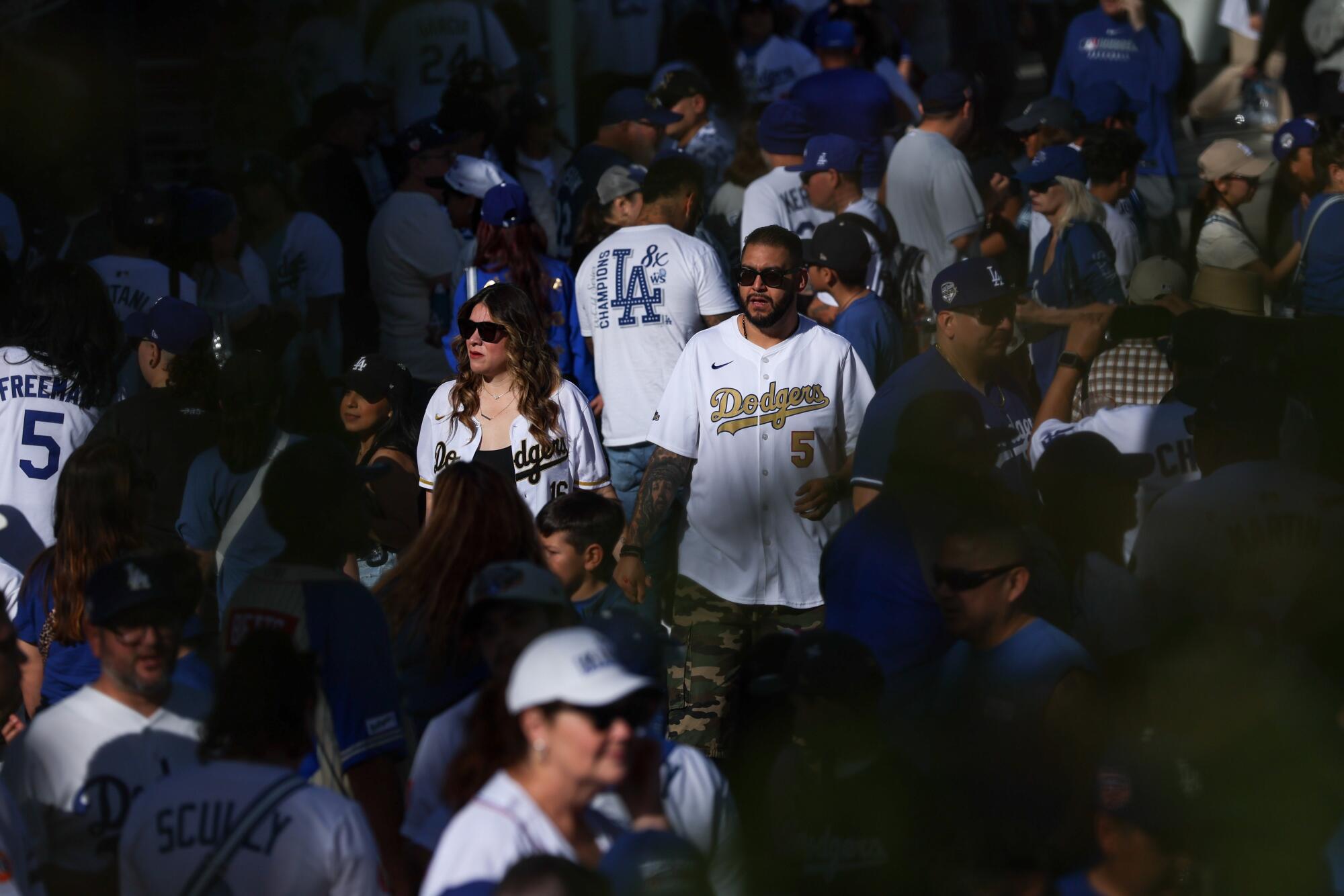Villainous Dodgers showing MLB owners how you should treat fans
An anonymous pitcher whose entire life changed with four innings is standing in a crowded Dodger Stadium bullpen in the middle of winter when he hears a voice from the stands.
“Will, thank you so much!” shouts a fan, and underneath his thick beard, the pitcher blushes.
“This is something I’ve never had before,” said Will Klein.
And this is ruining baseball?
On a crowded concourse in the middle of a Saturday morning two months before the start of the season, fans are chugging beers, scarfing Dodger dogs, and even doing a line dance.
The queue at the elevator is endless. The screams from the crowd are constant. Blake Snell is walking along one of the barriers giving every nearby fan — every one — a fist bump.
And this is ruining baseball?
The Dodgers officially opened their doors for the 2026 season Saturday, holding an annual Dodgerfest that has sent a clear message to a landscape of whiners.
This is what winning looks like.
This is why winning is worth it.
The baseball owners will likely lock out the players after this season in hopes of installing a salary cap that will curb the sort of spending that has fueled the Dodgers’ consecutive championships.
They don’t get it. In hoarding their revenue-sharing money, the owners don’t realize the benefits of reinvesting that money in the players and, by extension, the fans.
The Dodgers do that more often, and more effectively, than anyone.
The result Saturday was a mid-winter party that felt different than any of their previous bashes. Some years they spent this day apologizing for their playoff collapses. Last year they spent the afternoon tentatively talking about going back-to-back.

Fans pack into Dodger Stadium for Dodgerfest on Saturday.
(Ronaldo Bolanos/Los Angeles Times)
This year the constraints were off, the party was on, and they all spoke freely of becoming the first time in National League history to win three consecutive World Series titles.
”I don’t mind the ‘three in the air’ as a carrot,” said manager Dave Roberts, adding, “There’s a challenge we’re not going to run from.”
And so the players showed up brandishing hope for this summer while sweetly admitting the emotion that still lingers from last fall.
Klein, who came out of nowhere to rescue the Dodgers with four scoreless innings in the marathon Game 3 of the World Series, was still pinching himself about being recognized in public.
“A guy told me I looked like me,” he said. “I said, ‘Thank you.’”
Then there was Miguel Rojas, finding deeper meaning in his ninth-inning homer that tied the World Series Game 7.
”The most important part is that everybody continues to say that is the best moment that they have in their life, the best moment of sports they watched,” said Rojas. “That makes me feel really good, because we were part of something bigger than just a home run.”
And Rojas said he hears that a lot.
“I waited 20 years in professional baseball to have that moment … something different happened to my life,” he said. “I’m walking around Rome, I’m seeing Dodger fans saying thank you for that home run. It’s crazy, it’s overwhelming.”
Equally overwhelmed was Freddie Freeman, who grew tearful on the stage when talking about hitting the winning homer in the 18th inning of the World Series Game 3 and the impact of winning two titles in his four years here.
“I’m home playing baseball in front of the best fans day in and day out,” he said. “I couldn’t even wrap my mind around coming back and signing here and being part of this. This has blown me away.”
Even the struggling players seemed thrilled to be here, Tanner Scott acting amazingly relaxed when asked for his 2026 goals.
“Not being as bad as last year,” he said. “I was terrible.”
OK, then.
Bottom line, on a midwinter day when most of this country’s major-league baseball stadiums were empty, Chavez Ravine was full of life and wonder and winning.
“Today we see a lot of fans and that really gets me going,” said Shohei Ohtani.
And this is ruining baseball?
“This organization is never ready to be done … they continue to add players, they continue to add talent, that is a good thing,” said Rojas. “We push ourselves … we believe we can always get better.”
Like he said, a good thing.
“I like winning,” said Klein. “People are always going to be jealous of teams that try to win when they feel like others aren’t. Everybody can go out and do the same thing.”
Spring is here, the haters are out, and the Dodgers are ready.
Seeing players here, seeing their energy, obviously seeing the energy of the fans, its certainly time,” said Roberts.
Three-peat, you’re up.
